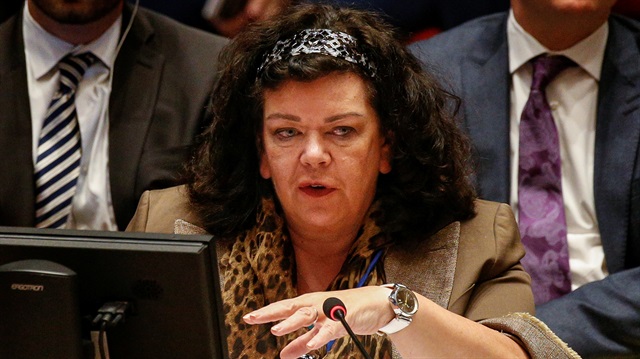
Security Council calls for probe into attack which killed dozens of children
The UN Security Council has called for a probe into a Saudi-led coalition airstrike in Yemen that left dozens of children dead.
The Security Council gathered Friday in a closed session to decide what should be done. Karen Pierce, the UK’s permanent representative to the UN, said the council called for a reliable and transparent investigation into the attack, which killed at least 50 children and injured 77 others.
Pierce stressed that all parties in Yemen should “respect their obligations under international humanitarian law, in particular the fundamental rules of distinction, proportionality and precautions in attack”.
The Security Council “expressed their grave concern at these and all other recent attacks in Yemen. They called for a credible and transparent investigation and they send their condolences to the victims and their families," Pierce said in a statement to the press following the session.
The Saudi-led coalition also announced the launch of an investigation into the attack.
The airstrike, which hit a bus carrying children in Saada, Yemen on Thursday, was the latest in a series of attacks by the U.S.-backed Saudi-led coalition in the country. The forces entered Yemen three years prior in order to fight Houthi rebels who had taken over the Yemeni government in the capital, Sanaa.
Yemen has been wracked by war since 2014, when Shia Houthi rebels overran much of the country, including Sanaa.
The loss of the capital forced President Abdrabbuh Mansur Hadi and his government to take up temporary residence in Yemen’s coastal city of Aden.
The conflict escalated in 2015 when Saudi Arabia and its Sunni-Arab allies -- accusing the Houthis of serving as Iranian proxies -- launched a massive air campaign in Yemen aimed at rolling back Houthi gains and shoring up Hadi’s pro-Saudi government.
UN-sponsored peace talks held in Kuwait the following year failed to end the destructive conflict.
The violence has devastated Yemen’s infrastructure, including water and sanitation systems, prompting the UN to describe the situation as “one of the worst humanitarian disasters of modern times”.




